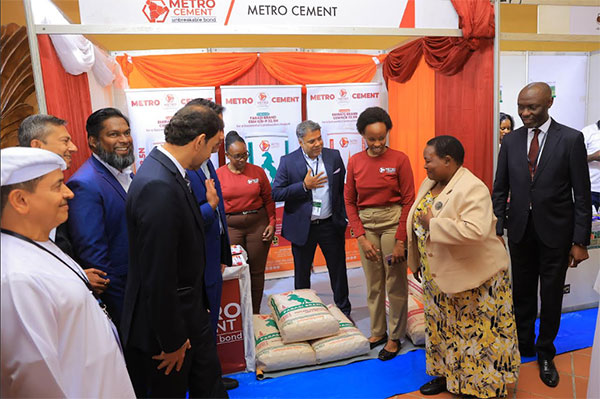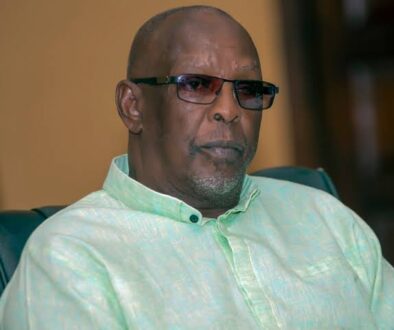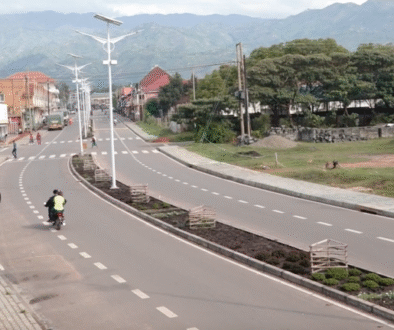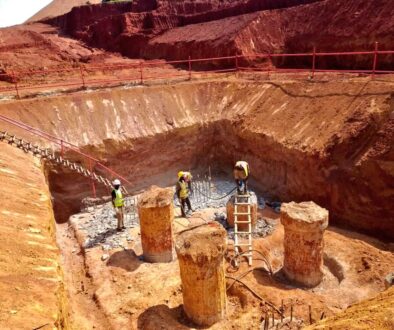Uganda, UAE tighten $6.3billion business ties

CAPTION: The Prime Minister Hon. Nabanja Robina visiting the different exhibition stalls at the ongoing UgandaUAEBusinessForum2025.
By Our reporter
MUNYONYO – Uganda and the United Arab Emirates (UAE) have reaffirmed their commitment to deepen economic cooperation across energy, infrastructure, agribusiness, and finance following high-level deliberations at the Fourth Uganda–UAE Business Forum held at Speke Resort, Munyonyo.
The three-day forum, organized by Uganda’s Missions in Abu Dhabi and Dubai in partnership with the Ministry of Foreign Affairs, and the UAE Embassy in Kampala, attracted more than 300 delegates from both nations.
“The value of UAE investment in Uganda’s energy, infrastructure, agribusiness, oil and gas, manufacturing, real estate, and tourism sectors has reached $3.5 billion,” Nabbanja said.
“Uganda ranks seventh among the fastest-growing economies in the world and maintains one of the most stable currencies on the continent.”
She reaffirmed the government’s vision to expand the economy tenfold by 2040.
“Our goal is to grow the size of Uganda’s economy from $61.3 billion to $500 billion by 2040,” Nabbanja said.
“We invite our partners from the United Arab Emirates to join us on this transformative journey as we move from lower-middle-income to upper-middle-income status.”
Minister of State for Investment Evelyn Anite urged UAE investors to seize new opportunities in inland water transport, mineral value addition, and affordable credit financing for Ugandan entrepreneurs.
“Our biggest constraint is access to credit,” she said. “We know you have cheap capital in the UAE — bring affordable financing so our small and medium enterprises can scale up production.”
She also called for partnership in developing modern vessels, port upgrades, and water-works along Lakes Victoria, Kyoga, and Albert, and in refineries to process gold and other minerals locally.
“The same model that attracted gold refiners to the UAE should bring them here,” Anite said.
“After you’ve paid your dues, you’re free to move or reinvest your profits. Uganda’s liberalized economy guarantees freedom and stability for investors.”

Currency Stability
Patrick Ayota, Managing Director of the National Social Security Fund (NSSF), highlighted the Uganda shilling’s resilience, noting that it has appreciated against the U.S. dollar over the past five years — a rare trend among African currencies.
“If you came into Uganda five years ago with $10,000 and converted it back today, you would have $695 more,” Ayota said. “That strength reflects confidence in Uganda’s fundamentals and an open, liberalized financial system.”
Ayota said NSSF is working with UAE institutions to co-invest in agriculture and food-security ventures, positioning Uganda as a production hub for the UAE’s 2051 domestic food strategy.
UAE Partnership
Uganda’s Ambassador to the UAE, Zaake Wanume Kibedi, said the relationship has evolved into a multi-sector partnership built on trade, infrastructure, and innovation.
“Trade between Uganda and the UAE has grown exponentially, making the UAE Uganda’s leading export destination,” Ambassador Kibedi said.
Ambassador Kibedi also highlighted the rapid expansion of trade between Uganda and the United Arab Emirates, noting that volumes have grown steadily over the past five years, positioning the UAE as Uganda’s largest export destination globally.
He attributed this growth to improved diplomatic engagement, continuous private sector dialogue, and the strong logistical connectivity between the two countries.
“Bilateral trade has expanded from just over $300 million in 2018 to $2.85 billion today,” Ambassador Kibedi said.
“This growth is not by coincidence- it reflects deliberate policy coordination, consistent investor confidence, and the trust our Emirati partners have in Uganda’s economic stability.”
He added that Uganda and the UAE are now transitioning from traditional trade to strategic co-investment partnerships in infrastructure, renewable energy, and agro-industrialization, underlining the mutual ambition to make the relationship a long-term driver of shared prosperity.
“Our partnership is no longer transactional — it is transformational,” he added.
“The focus now is to ensure that investments create jobs, promote technology transfer, and position Uganda as a key gateway for Gulf capital into Africa.”
Value addition
Peter Muramira, Director at the Uganda Investment Authority (UIA), said Uganda is transitioning from an energy-scarce to an energy-secure economy through a $70 billion investment portfolio spanning electricity, oil and gas, and industrial infrastructure.
He noted that projects such as the $30 billion Buyende Nuclear Power Plant, a $275 million LPG terminal, and a $5 billion petrochemical industrial park reflect Uganda’s commitment to sustainable industrialization and value addition.
Muramira emphasized that the government seeks investors who bring capital, technology, and expertise, adding that Uganda’s clear incentive framework and stable policy environment make it “not just open for business — but ready for transformation.”
The Ministry of Foreign Affairs said the deliberations reaffirm Uganda’s readiness to host world-class investments in energy, ICT, tourism, and manufacturing, in line with Vision 2040.
The forum continues on October 29, 2025, featuring sectoral panels, business-to-business (B2B) meetings, and field visits aimed at turning discussions into concrete partnerships.
.85 billion as of September 2025.
“The value of UAE investment in Uganda’s energy, infrastructure, agribusiness, oil and gas, manufacturing, real estate, and tourism sectors has reached .5 billion,” Nabbanja said.
“Uganda ranks seventh among the fastest-growing economies in the world and maintains one of the most stable currencies on the continent.”
She reaffirmed the government’s vision to expand the economy tenfold by 2040.
“Our goal is to grow the size of Uganda’s economy from .3 billion to 0 billion by 2040,” Nabbanja said.
“We invite our partners from the United Arab Emirates to join us on this transformative journey as we move from lower-middle-income to upper-middle-income status.”
Minister of State for Investment Evelyn Anite urged UAE investors to seize new opportunities in inland water transport, mineral value addition, and affordable credit financing for Ugandan entrepreneurs.
“Our biggest constraint is access to credit,” she said. “We know you have cheap capital in the UAE — bring affordable financing so our small and medium enterprises can scale up production.”
She also called for partnership in developing modern vessels, port upgrades, and water-works along Lakes Victoria, Kyoga, and Albert, and in refineries to process gold and other minerals locally.
“The same model that attracted gold refiners to the UAE should bring them here,” Anite said.
“After you’ve paid your dues, you’re free to move or reinvest your profits. Uganda’s liberalized economy guarantees freedom and stability for investors.”

Currency Stability
Patrick Ayota, Managing Director of the National Social Security Fund (NSSF), highlighted the Uganda shilling’s resilience, noting that it has appreciated against the U.S. dollar over the past five years — a rare trend among African currencies.
“If you came into Uganda five years ago with ,000 and converted it back today, you would have 5 more,” Ayota said. “That strength reflects confidence in Uganda’s fundamentals and an open, liberalized financial system.”
Ayota said NSSF is working with UAE institutions to co-invest in agriculture and food-security ventures, positioning Uganda as a production hub for the UAE’s 2051 domestic food strategy.
UAE Partnership
Uganda’s Ambassador to the UAE, Zaake Wanume Kibedi, said the relationship has evolved into a multi-sector partnership built on trade, infrastructure, and innovation.
“Trade between Uganda and the UAE has grown exponentially, making the UAE Uganda’s leading export destination,” Ambassador Kibedi said.
“This partnership represents a bridge of mutual prosperity.”
Ambassador Kibedi also highlighted the rapid expansion of trade between Uganda and the United Arab Emirates, noting that volumes have grown steadily over the past five years, positioning the UAE as Uganda’s largest export destination globally.
He attributed this growth to improved diplomatic engagement, continuous private sector dialogue, and the strong logistical connectivity between the two countries.
“Bilateral trade has expanded from just over 0 million in 2018 to .85 billion today,” Ambassador Kibedi said.
“This growth is not by coincidence- it reflects deliberate policy coordination, consistent investor confidence, and the trust our Emirati partners have in Uganda’s economic stability.”
He added that Uganda and the UAE are now transitioning from traditional trade to strategic co-investment partnerships in infrastructure, renewable energy, and agro-industrialization, underlining the mutual ambition to make the relationship a long-term driver of shared prosperity.
“Our partnership is no longer transactional — it is transformational,” he added.
“The focus now is to ensure that investments create jobs, promote technology transfer, and position Uganda as a key gateway for Gulf capital into Africa.”
Value addition
Peter Muramira, Director at the Uganda Investment Authority (UIA), said Uganda is transitioning from an energy-scarce to an energy-secure economy through a billion investment portfolio spanning electricity, oil and gas, and industrial infrastructure.
He noted that projects such as the billion Buyende Nuclear Power Plant, a 5 million LPG terminal, and a billion petrochemical industrial park reflect Uganda’s commitment to sustainable industrialization and value addition.
Muramira emphasized that the government seeks investors who bring capital, technology, and expertise, adding that Uganda’s clear incentive framework and stable policy environment make it “not just open for business — but ready for transformation.”
The Ministry of Foreign Affairs said the deliberations reaffirm Uganda’s readiness to host world-class investments in energy, ICT, tourism, and manufacturing, in line with Vision 2040.
The forum continues on October 29, 2025, featuring sectoral panels, business-to-business (B2B) meetings, and field visits aimed at turning discussions into concrete partnerships.
.85 billion as of September 2025.
“The value of UAE investment in Uganda’s energy, infrastructure, agribusiness, oil and gas, manufacturing, real estate, and tourism sectors has reached .5 billion,” Nabbanja said.
“Uganda ranks seventh among the fastest-growing economies in the world and maintains one of the most stable currencies on the continent.”
She reaffirmed the government’s vision to expand the economy tenfold by 2040.
“Our goal is to grow the size of Uganda’s economy from .3 billion to 0 billion by 2040,” Nabbanja said.
“We invite our partners from the United Arab Emirates to join us on this transformative journey as we move from lower-middle-income to upper-middle-income status.”
Minister of State for Investment Evelyn Anite urged UAE investors to seize new opportunities in inland water transport, mineral value addition, and affordable credit financing for Ugandan entrepreneurs.
“Our biggest constraint is access to credit,” she said. “We know you have cheap capital in the UAE — bring affordable financing so our small and medium enterprises can scale up production.”
She also called for partnership in developing modern vessels, port upgrades, and water-works along Lakes Victoria, Kyoga, and Albert, and in refineries to process gold and other minerals locally.
“The same model that attracted gold refiners to the UAE should bring them here,” Anite said.
“After you’ve paid your dues, you’re free to move or reinvest your profits. Uganda’s liberalized economy guarantees freedom and stability for investors.”

Currency Stability
Patrick Ayota, Managing Director of the National Social Security Fund (NSSF), highlighted the Uganda shilling’s resilience, noting that it has appreciated against the U.S. dollar over the past five years — a rare trend among African currencies.
“If you came into Uganda five years ago with ,000 and converted it back today, you would have 5 more,” Ayota said. “That strength reflects confidence in Uganda’s fundamentals and an open, liberalized financial system.”
Ayota said NSSF is working with UAE institutions to co-invest in agriculture and food-security ventures, positioning Uganda as a production hub for the UAE’s 2051 domestic food strategy.
UAE Partnership
Uganda’s Ambassador to the UAE, Zaake Wanume Kibedi, said the relationship has evolved into a multi-sector partnership built on trade, infrastructure, and innovation.
“Trade between Uganda and the UAE has grown exponentially, making the UAE Uganda’s leading export destination,” Ambassador Kibedi said.
“This partnership represents a bridge of mutual prosperity.”
Ambassador Kibedi also highlighted the rapid expansion of trade between Uganda and the United Arab Emirates, noting that volumes have grown steadily over the past five years, positioning the UAE as Uganda’s largest export destination globally.
He attributed this growth to improved diplomatic engagement, continuous private sector dialogue, and the strong logistical connectivity between the two countries.
“Bilateral trade has expanded from just over 0 million in 2018 to .85 billion today,” Ambassador Kibedi said.
“This growth is not by coincidence- it reflects deliberate policy coordination, consistent investor confidence, and the trust our Emirati partners have in Uganda’s economic stability.”
He added that Uganda and the UAE are now transitioning from traditional trade to strategic co-investment partnerships in infrastructure, renewable energy, and agro-industrialization, underlining the mutual ambition to make the relationship a long-term driver of shared prosperity.
“Our partnership is no longer transactional — it is transformational,” he added.
“The focus now is to ensure that investments create jobs, promote technology transfer, and position Uganda as a key gateway for Gulf capital into Africa.”
Value addition
Peter Muramira, Director at the Uganda Investment Authority (UIA), said Uganda is transitioning from an energy-scarce to an energy-secure economy through a billion investment portfolio spanning electricity, oil and gas, and industrial infrastructure.
He noted that projects such as the billion Buyende Nuclear Power Plant, a 5 million LPG terminal, and a billion petrochemical industrial park reflect Uganda’s commitment to sustainable industrialization and value addition.
Muramira emphasized that the government seeks investors who bring capital, technology, and expertise, adding that Uganda’s clear incentive framework and stable policy environment make it “not just open for business — but ready for transformation.”
The Ministry of Foreign Affairs said the deliberations reaffirm Uganda’s readiness to host world-class investments in energy, ICT, tourism, and manufacturing, in line with Vision 2040.
The forum continues on October 29, 2025, featuring sectoral panels, business-to-business (B2B) meetings, and field visits aimed at turning discussions into concrete partnerships.


